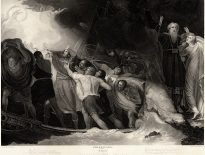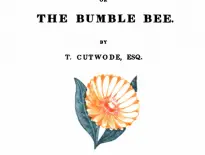John Skelton’s birthdate is unknown; however, historians have put forward suggestions that a date in the early 1560s is the most likely. Additionally, it is thought that he was born in the North of England. His family name may be derived from several locations named ‘Skelton’ in Yorkshire, however unfortunately for historiography, the majority of Skelton’s upbringing is wrapped in a mystery as a result of scarcely any remaining documents surviving that mention him. A significant proportion of Skelton’s life, and personality, is instead found in his poetry, which survives in manuscript form and has been seriously analysed by historians.
Much of Skelton’s education and university life are equally as elusive as his childhood years. Historians have debated whether he attended the universities of Oxford and/or Cambridge, and what degree he undertook. Historians have suggested that his alma mater may have been the University of Oxford. About 1490, in his preface to Eneydos (the translation into Middle Scots of the Latin Virgil’s Aeneid), William Caxton, scholar and merchant, refers to Skelton as ‘late created poet laureate in the University of Oxford’. Skelton may have been chosen as poet laureate as a result of him being a former student, but this is unlikely. The likelihood is that, as a result of Skelton’s impeccable writing, as reported by Caxton, he was chosen on merit rather than affiliation. Historian John Scattergood has suggested, instead, that Skelton’s poetry refers to his time at the University of Cambridge; that he refers to the institution as a ‘kind parent’ and that he ‘first sucked the breast of learning at Cambridge’. While there are several references to Skelton at Cambridge, it cannot be definitively said that he attended, but it seems more likely than Oxford.
Regardless of the institution that educated him, Skelton was praised as a scholarly man. Caxton, in his preface already quoted above, praises him for his classical learning and skill in translation. The 1490s witnessed the origins of the humanist educational movement in England, which would later be adopted by Thomas More’s household and the English royal family, with Katherine of Aragon instructing humanist scholars from Spain to create a template of education for her daughter, Princess Mary. Much of Skelton’s work reflected his interest in classical learning, for example, his translation of Cicero’s letter and other works from Latin to English. Equally, as mentioned earlier, his works began to earn him a good reputation at the latter end of the fifteenth century. Notable figures in academia and scholarship were writing in praise of him, for example, in 1499, Erasmus, in a letter to the future Henry VIII, states that in Skelton the prince has ‘a light and glory of English letters’. Additional to his patronage from major figures in academia and the nobility, significantly the Howard family, Skelton gained fame in his own right from his elegy on the death of Henry, 4th Earl of Northumberland; the extensive elegy was praised for its macabre composition and recognition of Northumberland as a noble and successful magnate - I shall incorporate a segment below.
‘I WAYLE, I wepe, I sobbe, I sigh ful sore.
The dedely fate, the dolefulle destenny
Of him that is gone, alas! withoute restore,
Of the bloud, royall descendinge nobelly;
Whos lordshepe doutles was slayne lamentably
Thorow treson ageyn hym compassyd and wrought;
Trew to his prince, in word, in dede, and thought.’
While the latter half of the 1400s witnessed Skelton demonstrating his literary prowess, in 1588, he entered into the service of the newly established Tudor royal family. As a well-respected man in the academic community, he was appointed as the personal tutor to Prince Henry, the future King Henry VIII. As mentioned earlier, much of Skelton’s personal life is practically unknown, therefore, historians have had to rely on his writings, particularly his poetry, to comprehend his characteristics. For example, his panegyric ‘epigramma ad sancti principus maiestatem’ was written to celebrate Prince Henry being created Duke of York on 1st November 1494. In terms of his success, Skelton was well received by the royal family and took his duties seriously. While he was evidently happy at court, some of his poems have a particularly anti-court sentiment to them (his most famous, regarding Wolsey, will be discussed later). In the satirical poem, ‘The Bowge of Courte’, the protagonist, a man named Drede, who is both kind and virtuous, finds himself on a ship (the Bowge of Courte) which is full of a sinister assortment of thieves, gamblers and pimps. An analysis of this poem suggests that Skelton is, allegorically, alluding to the characteristics of those vile courtiers at the Henrician court: those whom scheme, gossip and backstab each other.
Before Henry VIII’s accession to the throne, Skelton became Rector of St Mary’s Church in the Parish of Diss, Norfolk; a post he held until his death. However, he evidently had a yearning for court life and made a determined effort to return, regardless that his earlier poetry suggests he detested the lucrative nature of court life. In an effort to capitalise on the king’s vanity, Skelton wrote ‘A Lawde of Prayse made for our Sovereign Lord the Kyng’, praising him for uniting the Lancastrian and Yorkist lines. He further exploited his previous relationship with Henry, as his former tutor, and wrote ‘Chorus de Dys contra Gallos’ in 1513, which celebrated the capitulation of Thérouanne, France; additionally, this poem celebrated the king as the definitive ruler of the French. Henry’s campaigns in France, during the earlier years of his reign, were an enormously expensive and unnecessary affair. However, Henry’s military endeavours were a way in which to assert his kingship in terms of his rightful authority to rule; the Tudor throne was still relatively newly established by this point. Skelton was ingenious to praise these qualities in the king, chiefly because the English were triumphant over the French during these earlier invasions. It was around the early 1510s that Skelton began to refer to himself as ’Orator Regis’; essentially the spokesman for the king and/or official poet to him.
During Skelton’s time at court he, and the king’s foremost advisor, Cardinal Thomas Wolsey, engaged in a somewhat contentious relationship. The cardinal grew in the king’s favour – becoming his primary confidant – with his power, wealth and influence bitterly received by his fellow courtiers; Wolsey’s status as a butcher’s son received particularly derogatory attention. In 1521 Skelton published his ‘Speke Parott’ which is one of a series of court poems targeting the cardinal. It uses the parrot as a mouthpiece to criticise Wolsey and his selfish dealings at the Paris Peace Conference. Skelton believed Wolsey was primarily serving his own purposes, and the papacy, rather than the interests of Henry and the English kingdom. In his second anti-Wolsey poem, ‘Collyn Clout’, Skelton assumes the persona of a poor countryman; the poem is more straightforward and less refined than his earlier pieces. It essentially attacks the greed of English clergyman, their indulgences and the earthly pleasures in which they participate. Perhaps, however, Skelton’s most notable satirical jab at Wolsey was the passively entitled ‘Why come ye not to courte?’ Essentially, Skelton argues that Wolsey, in the council and in the Star Chamber, overbears the aristocracy; the horror at a butcher’s son holding more power than a distinguished magnate of the country. Skelton’s sardonic poem intends to place Wolsey on a similar platform to the king, alluding to Wolsey’s sense of superiority. To support this, Skelton states in his poem, ‘Why come ye not to court? To which court? To the king’s court? Or to Hampton Court? Nay, to the king’s court! The king’s court should have excellence, but Hampton Court hath the Pre-eminence, and York’s Place, with my Lord’s Grace.’ Skelton is referencing the fact that Wolsey is an immensely wealthy man, and that his establishment of York’s Place is a semi-pseudo court in itself; a potential rival to the king’s court.
Skelton died on 12th June 1529 and was buried before the high altar in St Margaret’s Church, Westminster, although no trace of the tomb remains today. Skelton was one of Tudor England’s foremost poets. He could write proficiently along a variety of writing styles, from elegies and satire to verse. He has been lauded the ‘last great poet of Catholic England’ and was a fervent conservative throughout his life (he died before England witnessed its religious upheaval only a few years after his death). The fact that Skelton signed, and referred to himself as poet laureate, is evidence of his awareness of his writing abilities; it would be unfair to characterise Skelton as just a successful satirist.
by Alexander Taylor
John Skelton's work can be enjoyed over at Archive.org.



Leave a Reply